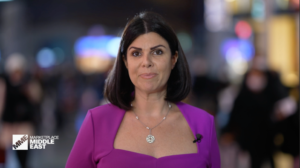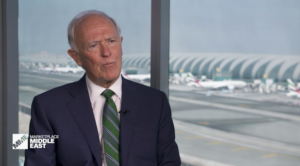CNN Explores The Resurgence Of The Airline Industry In The Middle East
In this month’s episode of Marketplace Middle East, CNN’s JomanaKaradshehand Salma Abdelaziz explore how airlines in the Middle East are recovering from the effects of the pandemic and how the industry is aiming to return with a focus on sustainability.
The Covid-19 pandemic has been one of the biggest challenges the airline industry has faced. As new variants threaten the steady recovery of the sector, CNN finds out how the Middle East’s regional carriers are pivoting their strategies and coping with the ‘new normal’.
Emirates President Tim Clark discusses how the omicron variant is impacting travel in the region, “I was actually very concerned about the effect that [new variants] would have particularly on the Emirates inbound loads to Dubai and the UAE in this month and in January, which are very, very strong. In my view, these variants are going to keep popping up. I’m one of the people that believes that the variants will dissipate in their effect over time as the global population becomes more immune.”
At the Dubai Airshow, CNN meets Sheik Ahmed bin Saeed Al Maktoum, CEO of the Emirates Group. The 2021 airshow was the biggest edition since the event began in 1989 and Al Maktoum is hopeful that this is a positive sign for Dubai, “When we are talking about the recovery, I think continuing with the program to continue to ensure that people coming to this place… they will be safe. They will be healthy. We care about them. That’s the most important, and that really has given the confidence for a lot of people to come to Dubai.”
Despite the pandemic setbacks, Al Maktoum is hopeful for Emirates’ future, “I can say going into the second month of the end of the year, we are into profit. So I hope the world will continue. I hope that this is the worst is over. And now we’re looking forward, ready to start again and reach the number of passenger and revenue that we used to do.”
Istanbul Airport in Turkey is projected to become the world’s busiest airport when expansion work is completed. Here, Karadsheh meets the airport’s CEO Kadri Samsunlu who says international cooperation is key to restarting the travel sector, “We still lack a bit on the harmonisation of traveling requirements. Every country is still imposing their own conditions, which makes traveling difficult. And if you don’t know if there are all certain certainties around your travel arrangements, you may consider staying at home or staying in your own country and travel there.”
Samsunlu credits a strong domestic air travel market, Turkey’s fast reopening to foreign tourists, and close coordination with hub carrier Turkish Airlines, with helping the airport get through a tough year. He hopes that new variants will not delay this progress, “If we panic every time a variant emerges this road is going to be very bumpy. But what I would recommend is basically we, the remedy – we have the vaccine – let’s promote vaccination. Anything beyond that… let’s not go back to 2020.”
As the industry prepares to bounce back, many are looking for more sustainable ways to operate flights. From light-weight cutlery and plant-based water bottles, to engines and route planning systems which optimise take-off and landing, Etihad Airways is exploring many sustainable options. Etihad CEO Tony Douglas speaks about how the pandemic has accelerated the implementation of these sustainable practices, “I think what we’re going to see is an acceleration of adoption. I think we’ll see a number of people off the back of the pandemic trading up to more modern aircraft types. I do believe we’ll see the availability of sustainable aviation fuels accelerate and as a consequence, a reduction in the cost.”
Etihad has partnered with Boeing to test the latest technologies, including using sustainable aviation fuels (SAF). While Douglas praises the benefits of using SAF, he cautions that there are still drawbacks at this time, “The availability of it is a massive challenge. It’s also three times more expensive. So even if you can get it, it’s not commercially sustainable. Because it’s not a one or the other conversation. You can’t be sustainable or profitable. You need to be sustainable and profitable.”
See more from Marketplace Middle East:
https://edition.cnn.com/specials/business/marketplace-middle-east









 Email: info@cyber-gear.com
Email: info@cyber-gear.com